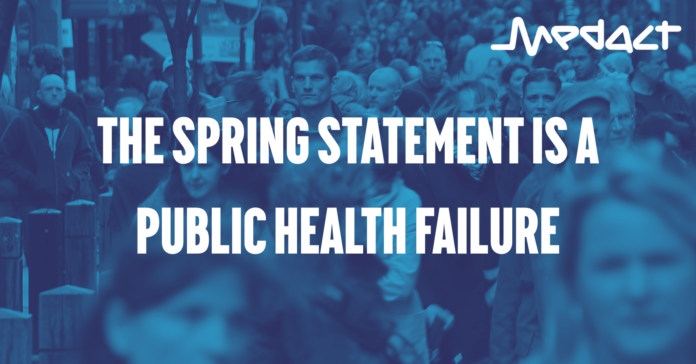At the twenty sixth of March 2025, the Chancellor introduced the spring observation. It delivered a bleak message: the federal government is opting for to chop necessary beef up for disabled other people and public well being extra widely, with a view to ‘meet fiscal objectives’. Of the £8.4 billion in spending cuts introduced, over half come from reductions to disability and health benefits. Economists have warned that the true scale of the cuts has been downplayed, with the affect on in poor health and disabled other people most probably a ways more than the figures recommend.
The cuts are a reaction to the forecasts from the Place of job for Price range Duty (OBR), which predicted that through 2029/30, the federal government would fall £4.1bn wanting assembly its daily spending wishes. To steer clear of breaching its personal self-imposed spending limits, the Chancellor lower £3.6bn from departmental budgets and £4.8bn from welfare spending. Somewhat than exploring fairer possible choices like taxing wealth or prime earning, and even ready till the Autumn Price range to reply, the federal government rushed to behave. And in doing so, positioned the load squarely on the ones already suffering maximum: disabled other people, other people in poverty, and the ones dwelling with long-term well being prerequisites.
In the meantime, the federal government has higher defence spending through £2.2bn. This can be a transparent sign of the place its priorities lie. In the course of a cost-of-living disaster, care, social safety, and well being are being intentionally deprioritised. On the subject of well being, it’s no longer as regards to underfunding; it’s about permitting our establishments to be offered off and exploited for benefit, turning very important care right into a commodity. At a time when products and services are underneath immense pressure and well being inequalities are deepening, those selections don’t seem to be simply economically short-sighted – they’re a public well being failure.
Incapacity advantages don’t seem to be luxuries – they’re lifelines. They’re very important helps in a machine that already fails to supply available healthcare, safe housing, or honest employment. For lots of, they’re the one way of dwelling with dignity in a society no longer constructed for them. Putting off those helps will widen inequalities, build up reliance on overstretched healthcare products and services, and in the long run deny other people their elementary proper to well being and dignity. Slicing them is not only morally indefensible – it’s economically counterproductive. Those insurance policies don’t get monetary savings in the longer term; they force extra other people into disaster and position an unsustainable burden at the NHS and society as an entire.
Those cuts replicate a deeper failure in how our economic system is administered. The present financial framework rewards temporary fixes over long-term funding. Responding to unsure forecasts through slashing beef up now isn’t strategic, however quite it’s reactive, and it units us up for deeper crises down the road. We should problem this failed good judgment that treats care as a value, and disabled other people as expendable.
We’ve observed this ahead of. Austerity has eroded public products and services and driven thousands and thousands into poverty and in poor health well being. It has left communities extra prone and uncovered to worsening well being results. Its penalties don’t seem to be summary – they’re felt in on a regular basis existence, within the prerequisites individuals are pressured to continue to exist in. When social safety is stripped away, other people don’t simply lose source of revenue – they lose the rules of a wholesome existence: heat properties, nutritious meals, get admission to to move, and the power to take part in society. The end result? Extra inequality, extra drive at the NHS, and extra other people denied their proper to well being and dignity.
Financial safety is a elementary pillar of fine well being. Any authentic dedication to cut back well being inequalities should get started with robust social protection nets. This Price range does the other – it speeds up the redistribution of assets clear of the ones in biggest want and undermines any efforts to construct a fairer, more healthy society. We want a brand new manner. One rooted in care, equity, and long-term pondering.
Incapacity justice is well being justice. Financial justice is public well being. And till our budgets replicate that, we can stay seeing the similar cycles of disaster, inequality, and avoidable hurt.
Around the nation, individuals are talking out and taking motion. We’re coming in combination to ward off towards those insurance policies of austerity and abandonment. This rising motion isn’t as regards to resisting damaging cuts – it’s about challenging a long run rooted in care, dignity, and justice. Persons are making their voices heard.
Disabled People Against Cuts (DPAC) are setting up protests and mobilising on-line to spotlight how the spring finances will irritate inequalities. The Welfare not Warfare marketing campaign has additionally taken to the streets, calling for a shift in priorities from army spending to funding in care and social beef up. Within the media, individuals are sharing their tales and difficult the federal government’s narrative, appearing the actual human charge of those selections. Researchers and economists are analysing and showcasing the choices we have now. And lots of are calling on their MPs to behave. In combination, we’re making it transparent: those selections received’t pass unchallenged.
You’ll be a part of that rising motion too through signing this open letter from our friends at Inclusion London.









